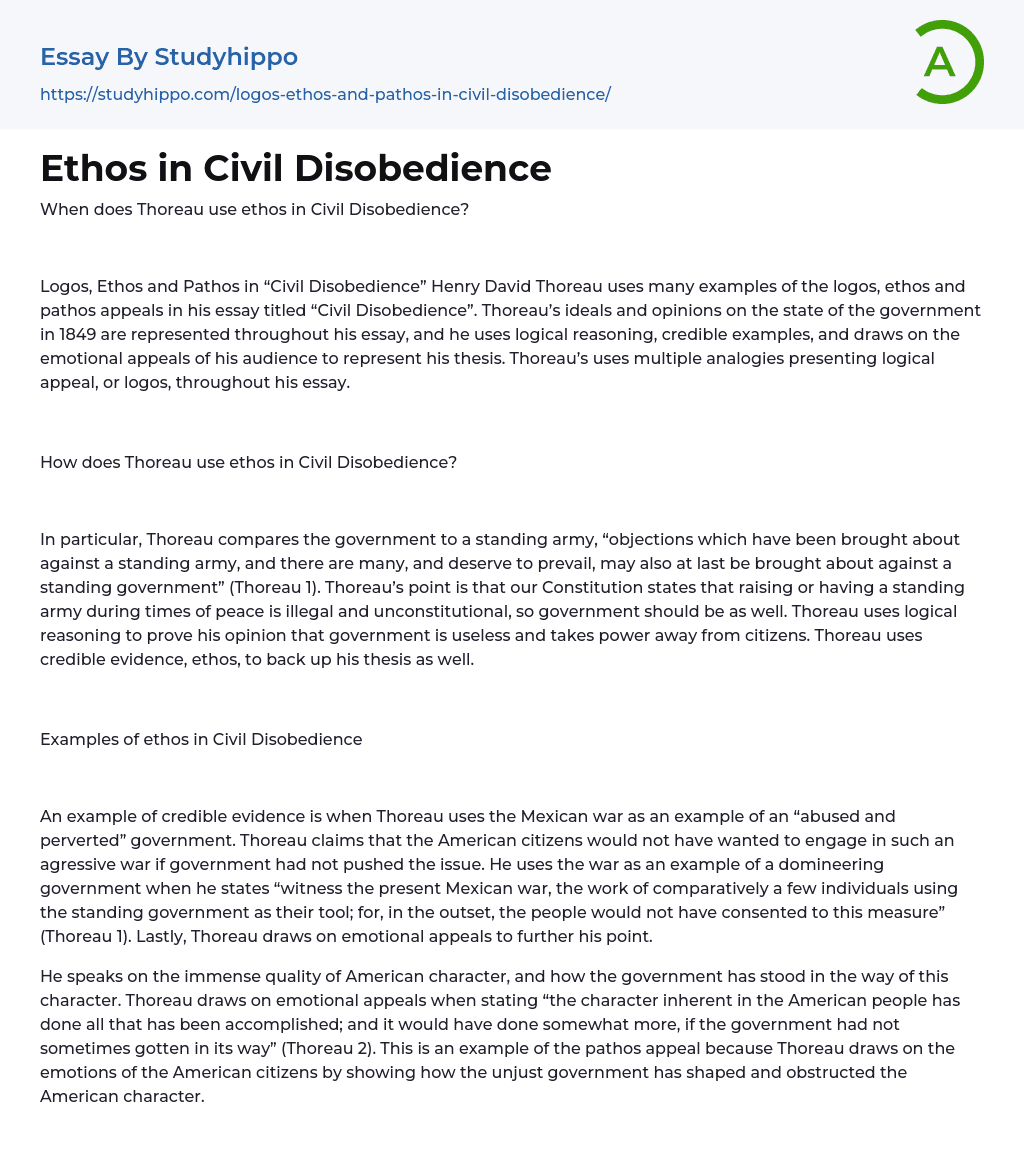When does Thoreau use ethos in Civil Disobedience?
Logos, Ethos and Pathos in “Civil Disobedience” Henry David Thoreau uses many examples of the logos, ethos and pathos appeals in his essay titled “Civil Disobedience”. Thoreau’s ideals and opinions on the state of the government in 1849 are represented throughout his essay, and he uses logical reasoning, credible examples, and draws on the emotional appeals of his audience to represent his thesis. Thoreau’s uses multiple analogies presenting logical appeal, or logos, throughout his essay.
How does Thoreau use ethos in Civil Disobedience?
In particular, Thoreau compares the government to a standing army, “objections which have been brought about against a standing army, and there are many, and deserve to prevail, may also at last be brought about against a standing government” (Thoreau 1). Thore
...au’s point is that our Constitution states that raising or having a standing army during times of peace is illegal and unconstitutional, so government should be as well. Thoreau uses logical reasoning to prove his opinion that government is useless and takes power away from citizens. Thoreau uses credible evidence, ethos, to back up his thesis as well.
Examples of ethos in Civil Disobedience
An example of credible evidence is when Thoreau uses the Mexican war as an example of an “abused and perverted” government. Thoreau claims that the American citizens would not have wanted to engage in such an agressive war if government had not pushed the issue. He uses the war as an example of a domineering government when he states “witness the present Mexican war, the work of comparatively a few individuals using the standing government as their tool; for, in the outset, the people
would not have consented to this measure” (Thoreau 1). Lastly, Thoreau draws on emotional appeals to further his point.
He speaks on the immense quality of American character, and how the government has stood in the way of this character. Thoreau draws on emotional appeals when stating “the character inherent in the American people has done all that has been accomplished; and it would have done somewhat more, if the government had not sometimes gotten in its way” (Thoreau 2). This is an example of the pathos appeal because Thoreau draws on the emotions of the American citizens by showing how the unjust government has shaped and obstructed the American character.
- Values of Life essays
- Ethical dilemma essays
- Normative Ethics essays
- Virtue Ethics essays
- Belief essays
- Deontology essays
- Moral essays
- Virtue essays
- Work Ethic essays
- Jurisprudence essays
- Social Injustice essays
- Juvenile Justice essays
- Civil Disobedience essays
- Montgomery Bus Boycott essays
- Protest essays
- Urbanization essays
- Acceptance essays
- Age Of Enlightenment essays
- Child Observation essays
- Confucianism essays
- Conscience essays
- Critical Reflection essays
- Destiny essays
- Determinism essays
- Empiricism essays
- Environmentalism essays
- Epistemology essays
- Ethics essays
- Ethos essays
- Existence essays
- Existentialism essays
- Fate essays
- Free Will essays
- Functionalism essays
- Future essays
- Good And Evil essays
- Human Nature essays
- Individualism essays
- Meaning Of Life essays
- Metaphysics essays
- Natural Law essays
- Personal Philosophy essays
- Philosophers essays
- Philosophy Of Life essays
- Political Philosophy essays
- Pragmatism essays
- Reality essays
- Relativism essays
- Teaching Philosophy essays
- Time essays




